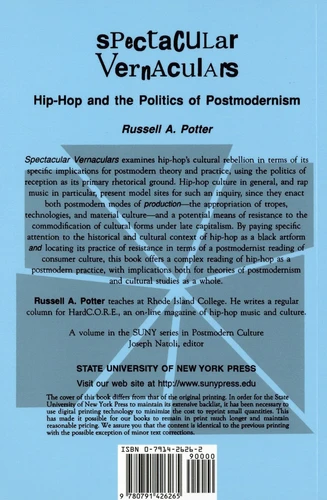Spectacular Vernaculars. Hip-Hop and the Politics of Postmodernism
Par :Formats :
- Paiement en ligne :
- Livraison à domicile ou en point Mondial Relay indisponible
- Retrait Click and Collect en magasin gratuit
- Réservation en ligne avec paiement en magasin :
- Indisponible pour réserver et payer en magasin
- Nombre de pages197
- PrésentationBroché
- FormatGrand Format
- Poids0.29 kg
- Dimensions15,3 cm × 19,8 cm × 1,4 cm
- ISBN0-7914-2626-2
- EAN9780791426265
- Date de parution01/01/1995
- CollectionSuny Series in Postmodern Cult
- ÉditeurSUNY Press
Résumé
Spectacular Vernaculars examines hip-hop's cultural rebellion in terms of its specific implications for postmodern theory and practice, using the politics of reception as its primary rhetorical ground. Hip-hop culture in general, and rap music in particular, present model sites for such an inquiry, since they enact both postmodern modes of production - the appropriation of tropes, technologies, and material culture - and a potential means of resistance to the commodification of cultural forms under late capitalism.
By paying specific attention to the historical and cultural context of hip-hop as a black artform and locating its practice of resistance in terms of a postmodernist reading of consumer culture, this book offers a complex reading of hip-hop as a postmodem practice, with implications both for theories of postmodernism and cultural studies as a whole.
By paying specific attention to the historical and cultural context of hip-hop as a black artform and locating its practice of resistance in terms of a postmodernist reading of consumer culture, this book offers a complex reading of hip-hop as a postmodem practice, with implications both for theories of postmodernism and cultural studies as a whole.
Spectacular Vernaculars examines hip-hop's cultural rebellion in terms of its specific implications for postmodern theory and practice, using the politics of reception as its primary rhetorical ground. Hip-hop culture in general, and rap music in particular, present model sites for such an inquiry, since they enact both postmodern modes of production - the appropriation of tropes, technologies, and material culture - and a potential means of resistance to the commodification of cultural forms under late capitalism.
By paying specific attention to the historical and cultural context of hip-hop as a black artform and locating its practice of resistance in terms of a postmodernist reading of consumer culture, this book offers a complex reading of hip-hop as a postmodem practice, with implications both for theories of postmodernism and cultural studies as a whole.
By paying specific attention to the historical and cultural context of hip-hop as a black artform and locating its practice of resistance in terms of a postmodernist reading of consumer culture, this book offers a complex reading of hip-hop as a postmodem practice, with implications both for theories of postmodernism and cultural studies as a whole.

